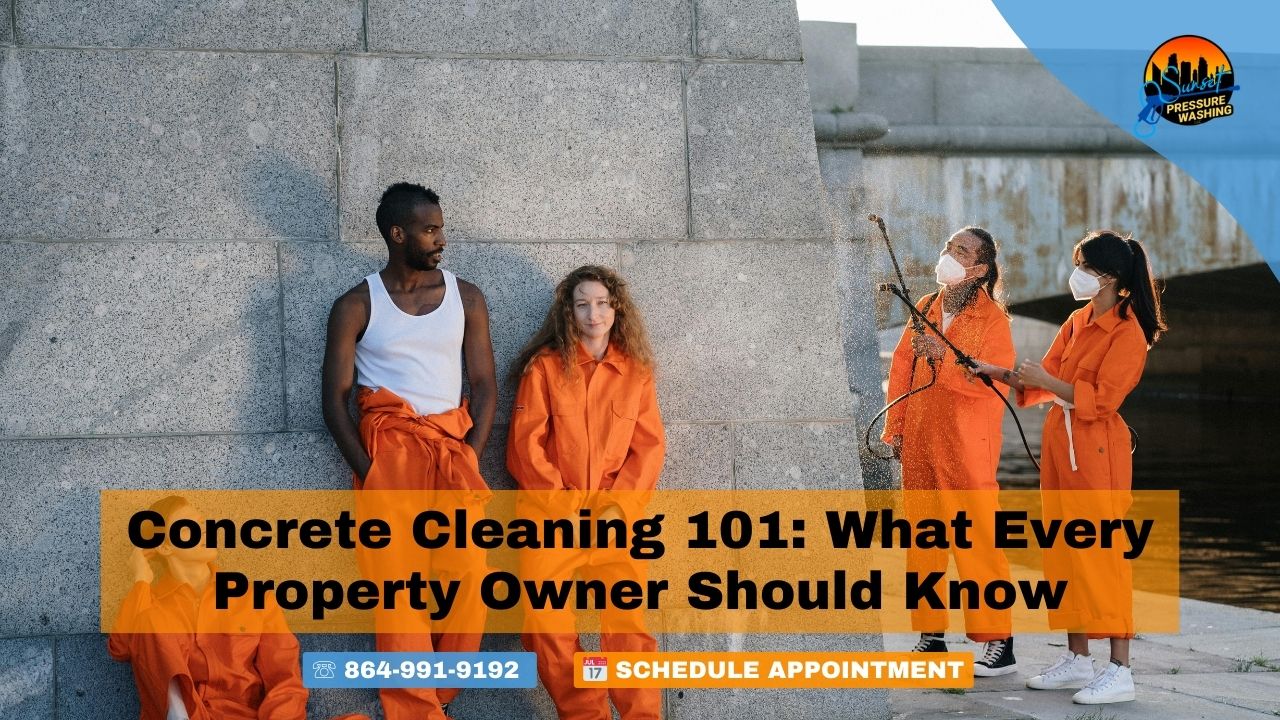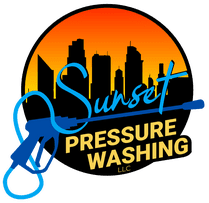
Concrete Cleaning 101: What Every Property Owner Should Know
Concrete surfaces get dirty over time, collecting stains from oil, mold, dirt, and more. If left uncleaned, these stains can weaken the concrete and make your property look unkempt. Regular concrete cleaning helps maintain curb appeal, prevents damage, and extends the life of your driveway, patio, or walkway. Whether you’re a homeowner or a business owner, knowing the right cleaning methods can save you time and money. In this guide, we’ll cover everything you need to know about keeping your concrete surfaces clean and looking their best.
Why Concrete Cleaning Matters for Your Property]]]]]
The Impact of Dirt, Stains, and Contaminants on Concrete
Concrete surfaces are exposed to the elements daily, collecting dirt, oil, mold, mildew, and other contaminants. These stains don’t just make the surface look bad—they can also weaken the material over time. Oil and grease penetrate deep into the concrete, making removal difficult and creating slick, unsafe spots. Mold and algae thrive in damp areas, leading to slippery surfaces that pose a hazard to pedestrians. Without proper cleaning, these stains become harder to remove and can lead to permanent discoloration.
How Regular Cleaning Enhances Curb Appeal and Property Value
A clean property always looks more inviting. Whether it’s a home or a business, dirty and stained concrete can make an entire space feel unkempt. Regular concrete cleaning keeps driveways, sidewalks, and patios looking bright and well-maintained. This is especially important if you’re planning to sell your property, as clean exteriors increase curb appeal and can boost resale value. Businesses also benefit from clean walkways and parking lots, as they help attract customers and maintain a professional image.
Preventing Damage: How Proper Maintenance Extends Concrete Lifespan
Neglecting concrete surfaces can lead to costly repairs. Stains from oil, rust, and organic growth can seep into the material, causing cracks and weakening the structure. Over time, moisture can enter these cracks, leading to further damage, especially in areas with frequent temperature changes. Regular cleaning removes harmful substances before they cause long-term damage, extending the lifespan of your concrete. By investing in routine maintenance, property owners can avoid expensive repairs and keep their surfaces in top condition for years to come.
Common Concrete Stains and How to Remove Them
Oil and Grease Stains (Causes and Effective Removal Methods)
Oil and grease stains are common on driveways and parking lots, usually caused by vehicle leaks or accidental spills. These stains not only make concrete look dirty but also create slippery spots that can be hazardous.
How to Remove Oil and Grease Stains:
- Absorb the spill immediately – Use cat litter, sawdust, or baking soda to soak up excess oil before it penetrates the concrete.
- Use a degreaser – Apply a commercial concrete degreaser or dish soap mixed with warm water. Scrub the area with a stiff brush.
- Pressure washing – For deep-set stains, professional pressure washing can remove embedded oil from concrete pores.
- Apply baking soda or poultice – A paste made of baking soda and water can help lift stubborn stains when left overnight before rinsing.
Mold, Mildew, and Algae Growth (Why It Happens and How to Prevent It)
Mold, mildew, and algae thrive in damp, shaded areas, making sidewalks, patios, and pool decks susceptible to growth. These stains not only look bad but also create slippery surfaces, increasing the risk of slips and falls.
How to Remove and Prevent Mold, Mildew, and Algae:
- Use a bleach solution – Mix one part bleach with three parts water and scrub the affected area to kill mold and algae.
- Apply a commercial mold remover – There are eco-friendly cleaners specifically designed to eliminate organic growth without harming surrounding plants.
- Pressure wash the area – A high-pressure wash can remove deep-rooted mold and mildew from concrete surfaces.
- Improve drainage and sunlight exposure – Prevent future growth by trimming overhanging trees, clearing gutters, and ensuring proper water runoff.
Rust and Efflorescence Stains (What Causes Them and Best Removal Solutions)
Rust stains on concrete are often caused by metal objects like patio furniture, fertilizer runoff, or water from iron pipes. Efflorescence, on the other hand, is a white powdery residue that forms when water-soluble salts rise to the surface of the concrete.
How to Remove Rust and Efflorescence Stains:
- Rust stains:
- Use white vinegar or lemon juice – Their acidic properties help break down rust stains when left to sit before scrubbing.
- Try a commercial rust remover – Products containing oxalic acid work well for stubborn stains.
- Avoid using bleach – It can react with rust and make stains worse.
- Efflorescence stains:
- Brush the surface with a stiff bristle broom to remove loose residue.
- Apply a diluted vinegar solution and scrub to dissolve salt deposits.
- Seal the concrete to prevent water absorption and future efflorescence buildup.
Tire Marks and Traffic Stains (How to Keep Driveways and Parking Lots Clean)
Tire marks occur when hot rubber from car tires bonds with concrete, leaving unsightly black streaks. In high-traffic areas like parking lots and driveways, dirt and grime also accumulate quickly.
How to Remove Tire Marks and Traffic Stains:
- Use a degreaser or dish soap – Scrub with a stiff brush to break down tire residue.
- Apply baking soda or a solvent-based cleaner – Let it sit before scrubbing and rinsing thoroughly.
- Pressure wash with hot water – High-pressure washing is the most effective way to remove tire marks and deep-set traffic stains.
- Regular maintenance – Sweep and wash concrete surfaces periodically to prevent buildup and make cleaning easier over time.
By understanding these common stains and using the right cleaning techniques, you can keep your concrete surfaces looking clean and well-maintained for years to come.
DIY vs. Professional Concrete Cleaning: What’s the Best Choice?
Pros and Cons of DIY Concrete Cleaning (Common Methods and Limitations)
Many people opt for DIY concrete cleaning to save money, using household products or rented equipment. While DIY methods can work for light cleaning, they have several limitations when dealing with deep stains or large areas.
Common DIY Cleaning Methods:
- Soap and water – Works for basic dirt removal but struggles with deep-set stains.
- Vinegar or baking soda – Can help lift minor stains but may require excessive scrubbing.
- Pressure washer rental – More effective than scrubbing but requires proper technique to avoid surface damage.
Pros of DIY Concrete Cleaning:
✔ Cost-effective for light cleaning.
✔ Convenient for small areas like patios and sidewalks.
✔ Immediate action on fresh spills or stains.
Cons of DIY Concrete Cleaning:
✖ Limited effectiveness on oil, grease, and rust stains.
✖ Pressure washer misuse can etch or damage concrete.
✖ Requires time, effort, and the right equipment.
✖ May not provide long-lasting results.
DIY cleaning is a good option for minor upkeep, but for stubborn stains and large surfaces, professional services offer better results.
The Benefits of Hiring Professional Pressure Washing Services
Professional concrete cleaning goes beyond surface-level cleaning by using high-powered equipment and specialized solutions to restore concrete to its original condition.
Why Choose Professional Concrete Cleaning?
- Powerful pressure washing equipment – Removes dirt, mold, oil, and stains more effectively than DIY methods.
- Eco-friendly and safe cleaning solutions – Professionals use the right chemicals without harming the environment.
- Saves time and effort – No need to spend hours scrubbing or figuring out the best method.
- Prevents damage – Experts know the right pressure settings to clean concrete without causing cracks or etching.
- Long-lasting results – Proper cleaning extends the lifespan of your concrete and reduces the need for frequent maintenance.
Whether you own a home or a business, hiring a professional ensures a deeper clean with better protection against future stains.
When to Call a Professional for Deep Cleaning and Stubborn Stains
Not all stains can be removed with DIY methods. If your concrete surfaces have deep discoloration, buildup, or extensive staining, it’s time to call in the experts.
Signs You Need Professional Concrete Cleaning:
✅ Stubborn oil, grease, or rust stains that won’t lift with DIY methods.
✅ Mold, algae, or mildew growth creating a slippery surface.
✅ Large areas like driveways, parking lots, or sidewalks that need cleaning.
✅ Discolored or stained concrete that affects your property’s curb appeal.
✅ Regular maintenance for commercial properties with high foot or vehicle traffic.
A professional cleaning service not only restores your concrete but also prevents further damage, saving you money in the long run. If you want hassle-free, effective results, hiring a professional is the best choice.
Best Methods for Effective Concrete Cleaning
Pressure Washing vs. Soft Washing for Concrete Surfaces
When it comes to cleaning concrete, two common methods are pressure washing and soft washing. Each technique serves a different purpose, and choosing the right one depends on the condition of the surface and the type of contaminants present.
Pressure Washing:
- Uses high-pressure water to blast away dirt, grime, and stains.
- Best for tough stains like oil, grease, and tire marks.
- Can remove mold, algae, and mildew effectively.
- Requires proper technique to avoid damaging the surface.
Soft Washing:
- Uses low-pressure water combined with cleaning solutions.
- Ideal for delicate surfaces or heavily stained areas.
- Effective for removing mold, mildew, and organic growth without high pressure.
- Safer for older or weakened concrete that could crack under high pressure.
Which One Should You Use?
- For tough stains and dirt buildup: Pressure washing is the best choice.
- For mold, mildew, and delicate surfaces: Soft washing is a safer and effective alternative.
- For routine maintenance: A combination of both methods may be used, depending on the condition of the concrete.
Eco-Friendly Cleaning Solutions for Concrete Maintenance
Many traditional concrete cleaning solutions contain harsh chemicals that can harm plants, pets, and the environment. Fortunately, there are eco-friendly alternatives that effectively clean concrete while being safer for the surroundings.
Best Eco-Friendly Cleaning Solutions:
- Baking Soda and Vinegar: A natural way to lift stains and deodorize surfaces.
- Hydrogen Peroxide: Works well for removing organic stains like mildew and algae.
- Biodegradable Degreasers: Designed to break down oil and grease without harming the environment.
- Oxygen Bleach: A non-toxic alternative to chlorine bleach for killing mold and mildew.
Tips for Green Concrete Cleaning:
- Use a broom or leaf blower to remove debris before washing.
- Opt for plant-friendly, biodegradable cleaners when possible.
- Avoid using excessive amounts of water by spot-cleaning stains as needed.
- Hire a professional pressure washing company that uses eco-friendly cleaning agents.
How to Protect and Seal Concrete After Cleaning
Once concrete has been thoroughly cleaned, it’s important to protect it from future stains and damage. Sealing concrete creates a protective barrier that repels water, oil, and other contaminants while extending the life of the surface.
Steps to Seal Concrete:
- Allow the Surface to Dry Completely: After cleaning, wait at least 24-48 hours before applying a sealer.
- Choose the Right Sealer: Options include penetrating sealers (for a natural look) or film-forming sealers (for added shine and protection).
- Apply the Sealer Evenly: Use a roller or sprayer to ensure smooth, uniform coverage.
- Let the Sealer Cure: Drying times vary, but most sealers need 24-48 hours to fully cure before foot or vehicle traffic.
- Reapply as Needed: Most sealers last 2-5 years, depending on weather conditions and usage.
Benefits of Sealing Concrete:
✔ Prevents water absorption and freeze-thaw damage.
✔ Reduces staining from oil, grease, and chemicals.
✔ Makes future cleaning easier by preventing dirt buildup.
✔ Enhances the appearance and lifespan of concrete surfaces.
Regular maintenance, combined with proper cleaning and sealing, ensures that your concrete surfaces stay in great condition for years to come. Whether you choose DIY methods or professional services, investing in the right cleaning and protection methods will keep your property looking its best.
Concrete Cleaning for Different Property Types
Residential Concrete Cleaning
Homeowners often overlook the importance of concrete cleaning until stains and discoloration become noticeable. Driveways, sidewalks, patios, and pool decks collect dirt, oil, algae, and mildew over time, making surfaces slippery and unappealing.
Common Residential Concrete Issues:
- Oil and grease stains from vehicles.
- Mold, mildew, and algae growth on shaded patios and sidewalks.
- Pool deck stains from chemicals and moisture buildup.
- General dirt and discoloration from weather exposure.
Best Cleaning Methods:
- Pressure Washing: Removes built-up dirt, tire marks, and oil stains.
- Soft Washing: A gentler alternative for pool decks and delicate surfaces.
- Eco-Friendly Cleaning Solutions: Helps eliminate mold and algae without harming plants or pets.
Regular maintenance ensures your home’s exterior remains clean and safe for family and guests.
Commercial Concrete Cleaning
For businesses, maintaining a clean exterior is crucial for attracting customers and maintaining a professional image. Dirty parking lots, stained sidewalks, and discolored storefronts can give the wrong impression and deter visitors.
Common Commercial Concrete Issues:
- Tire marks, oil spills, and grease stains in parking lots.
- Gum, food stains, and foot traffic residue on sidewalks.
- Mold, algae, and dirt buildup on storefront entrances.
Best Cleaning Methods:
- High-Pressure Washing: Quickly removes deep stains and built-up grime.
- Degreasing Solutions: Essential for restaurant sidewalks and parking lots.
- Scheduled Cleaning Services: Keeps business exteriors looking clean year-round.
A clean business exterior not only enhances curb appeal but also ensures safety for customers and employees.
Industrial Concrete Cleaning
Industrial facilities experience heavy-duty wear and tear, with concrete surfaces exposed to grease, chemicals, and machinery. Without proper cleaning, buildup can create safety hazards and lead to long-term structural damage.
Common Industrial Concrete Issues:
- Oil, grease, and chemical spills in warehouses and factories.
- Heavy tire marks and debris on loading docks.
- Dust and dirt accumulation in high-traffic areas.
Best Cleaning Methods:
- Industrial-Grade Pressure Washing: Removes deep stains and contaminants.
- Chemical Cleaning Solutions: Breaks down stubborn oil and grease.
- Routine Maintenance Plans: Keeps facilities clean and compliant with safety standards.
Proper cleaning not only keeps industrial spaces looking professional but also ensures a safe working environment for employees.
No matter the property type, regular concrete cleaning is essential for maintaining appearance, safety, and durability. Whether you own a home, a business, or an industrial facility, professional cleaning services can help keep your concrete surfaces in top condition.
How Often Should You Clean Your Concrete Surfaces?
Factors That Influence Cleaning Frequency
The frequency of concrete cleaning varies based on several key factors:
- Climate: Areas with heavy rainfall, high humidity, or frequent snowfall may require more frequent cleaning due to mold, mildew, and water stains. In drier regions, dust and dirt buildup may be the main concern.
- Usage: High-traffic areas like driveways, sidewalks, and parking lots accumulate dirt and stains faster than patios or lesser-used surfaces. Commercial properties often require more frequent cleaning than residential ones.
- Exposure to Elements: Concrete surfaces exposed to trees, vehicle traffic, or moisture will stain more quickly. For example, driveways near trees may collect leaves and sap, while pool decks are prone to chlorine stains and algae growth.
General Cleaning Recommendations:
- Residential concrete surfaces (driveways, sidewalks, patios) – At least once or twice a year, with spot cleaning as needed.
- Commercial properties (parking lots, storefronts, walkways) – Every few months to maintain a clean and professional appearance.
- Industrial areas (warehouses, loading docks, factories) – More frequent cleanings, typically on a scheduled maintenance plan.
Seasonal Concrete Cleaning Tips for Optimal Maintenance
Different seasons bring different challenges for concrete maintenance. Adapting your cleaning routine to the time of year helps protect your surfaces from seasonal damage.
Spring:
- Remove winter residue, including salt and de-icing chemicals that can erode concrete.
- Pressure wash driveways and sidewalks to remove dirt and grime accumulated during colder months.
- Treat mold and mildew growth caused by increased moisture.
Summer:
- Clean up oil stains and tire marks from increased vehicle traffic.
- Sweep and wash patios and pool decks regularly to prevent algae buildup.
- Consider applying a concrete sealer to protect against heat and UV damage.
Fall:
- Remove fallen leaves and organic debris that can stain concrete surfaces.
- Clean gutters to prevent water overflow onto driveways and sidewalks.
- Pressure wash before winter to remove buildup and prepare for colder conditions.
Winter:
- Avoid using harsh de-icing chemicals that can damage concrete.
- Shovel snow promptly to prevent ice from forming and causing slips.
- Inspect concrete for cracks and address any repairs before freeze-thaw cycles worsen the damage.
By following a seasonal cleaning routine and addressing stains early, you can extend the life of your concrete surfaces and keep them looking clean year-round. If deep stains or heavy buildup occur, hiring a professional pressure washing service ensures the best results.
Don’t let stains settle—pressure wash the stress away!
Keeping your concrete surfaces clean is essential for maintaining their appearance, safety, and durability. Regular concrete cleaning prevents stains, mold, and damage, saving you time and money in the long run. Whether you’re dealing with a dirty driveway, a stained patio, or a high-traffic parking lot, the right concrete cleaning methods make all the difference. While DIY cleaning can help with minor upkeep, Sunset Pressure Washing delivers deep, long-lasting results with professional pressure washing services. If your concrete needs a thorough cleaning, contact us today for expert concrete cleaning and a free quote!


